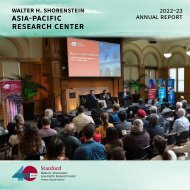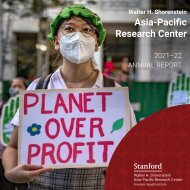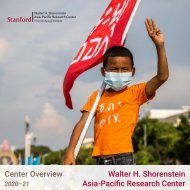Shorenstein Asia-Pacific Research Center 2018-19 Annual Report
The Walter H. Shorenstein Asia-Pacific Research Center (Shorenstein APARC) addresses critical issues affecting the countries of Asia, their regional and global affairs, and U.S.-Asia relations. As Stanford University’s hub for the interdisciplinary study of contemporary Asia, we produce policy-relevant research, provide education and training to students, scholars, and practitioners, and strengthen dialogue and cooperation between counterparts in the Asia-Pacific and the United States. This is our annual overview for the academic year 2018-19.
The Walter H. Shorenstein Asia-Pacific Research Center (Shorenstein APARC) addresses critical issues affecting the countries of Asia, their regional and global affairs, and U.S.-Asia relations. As Stanford University’s hub for the interdisciplinary study of contemporary Asia, we produce policy-relevant research, provide education and training to students, scholars, and practitioners, and strengthen dialogue and cooperation between counterparts in the Asia-Pacific and the United States. This is our annual overview for the academic year 2018-19.
Create successful ePaper yourself
Turn your PDF publications into a flip-book with our unique Google optimized e-Paper software.
POLICY
Director Roundtables
Advance U.S-Asia Dialogue
Shorenstein APARC frequently creates opportunities
for candid conversations between academics
and U.S. and Asian officials, advancing dialogue
with U.S. counterparts in Asia and bringing Stanford
research to bear on pressing policy issues. One of the
Center’s guests this past year was Cho Yoon-je, ambassador
of the Republic of Korea to the United States, who in
November 2018 joined faculty members from the Freeman
Spogli Institute for International Studies and other
Stanford experts for a discussion about North Korea
diplomacy and U.S.-ROK relations. Ambassador Cho
expressed South Korea’s determination to seize the
opportunity for rapprochement with the North and
its commitment to the U.S.-ROK alliance.
READ MORE // stanford.io/2E5euue
ABOVE Ambassador Cho Yoon-je (center) speaks with FSI senior
fellow Siegfried Hecker (left) and Center director Gi-Wook Shin.
Peering into the Future of the International Order in East Asia
Interstate relations in East Asia are at a critical
juncture. The post-World War II regional order —
shaped by the San Francisco Treaty of 1951,
underpinned by a common commitment to a liberal
trade system, and led by the United States — is under
stress, as the environment that sustained it has been
transformed since the end of the Cold War through
the rise of China and recent changes in U.S. foreign
policy. Will the “San Francisco System” be maintained,
and if not, what will replace it?
“Bringing together the four democracies
of the ‘Quad’ [Australia, India, Japan, and
the United States] — could pave a path
forward towards more comprehensive
cooperation in the Indo-Pacific region at a
time of increased geopolitical uncertainty.”
Ambassador Michael Armacost
These questions took center stage at a May 2019
symposium, “The Past, Present, and Future International
Order in East Asia,” cosponsored by the Japan
Institute for International Affairs and the Japan
Program at Shorenstein APARC. The participants
included experts in international relations, political
and diplomatic history in Asia, American foreign
policy and history, Japan-PRC relations and politics,
security interests in the Indo-Pacific region, and
U.S.-Asia regional engagement. They offered insights
on the rise and fall of international systems; explored
the circumstances that shaped the establishment of
the security architecture in East Asia and the forces
that propelled its evolution; and debated possible
futures for East Asia and the greater Indo-Pacific region
vis-à-vis the roles of the United States, Japan, and
China, the changing distribution of global power,
alliance structures, and political ideologies.
READ MORE // stanford.io/2lzka96
14 SHORENSTEIN APARC






